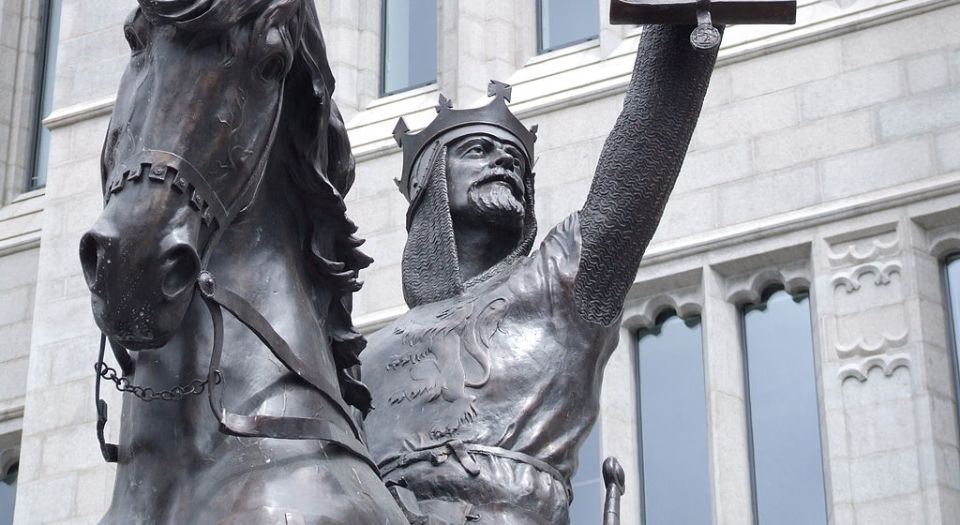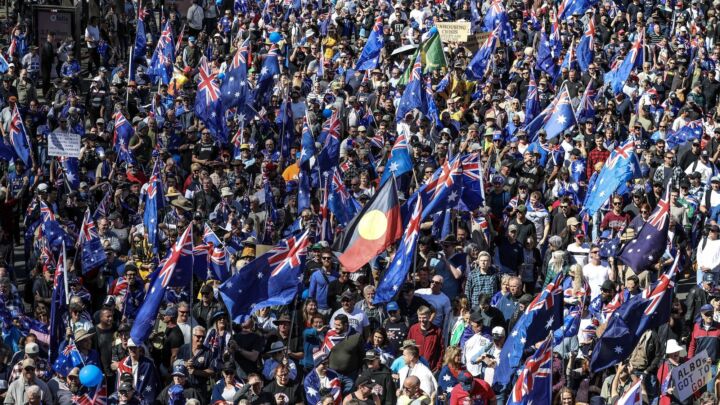The ‘Yes’ campaign’s version of history is Scotch mist
Six myths being peddled by left-wing converts to Scottish independence.

Want unlimited, ad-free access? Become a spiked supporter.
Left-wing campaigners in the coming referendum claim that Scotland’s radical history proves the progressive case for independence from the UK. As always, however, history is a battleground. A brief survey might help debunk some of these misty-eyed myths.
1) ‘The Union was a rapine Act of English conquest’
There is no point trying to pass off a compromise by the Scottish bourgeoisie as a rerun of Hollywood’s Braveheart. The 1707 Act of Union was more a consensual coupling of two parliaments than a rapine conquest. True, they were hardly of equal strength. The English parliament used all of its powers to persuade a Scottish government that had been almost bankrupted by the humiliating failure of the Darien Scheme, the Kingdom of Scotland’s first and last colony, in central America.
Yet ultimately the Scottish parliament voted freely to accept the Union as offering the best prospect for rapid economic advance in their largely rural land. The 1707 Act of Union was a unique and voluntary coming together of two capitalist elites within the British state.
Contrast it with the 1801 Act of Union between Britain and Ireland. In 1798 the British crushed the United Irishmen’s rebellion, killing 50,000, imposed the Union, wiped out Irish industry with British manufacturers and turned Ireland into a market garden to feed England while Irish peasants starved. The Scottish bourgeoisie did not stage any comparable uprising. It signed up to the Union, and reaped the benefits of the British industrial revolution.
2) ‘Ordinary Scots fought against the English overlords’
There were some riots in the major Scottish cities when the Act of Union was passed and the Scottish parliament abolished. But these were more signs of dissatisfaction with the conniving Scottish politicians, landowners and lords who would reap the biggest economic benefits than a nationalist revolt against English rule. (Rioting was no rare thing, being one of the few ways for the emerging proletariat to express its political opinions across Britain in the age before mass democracy.)
The Jacobite rebellions against the Union that followed in 1715 and 1745 are not to be confused with the Jacobin revolutionaries of France. The reactionary Jacobite project of restoring the Catholic Stuarts to the throne brought together those disaffected elements of Scottish society, such as the defenders of the backward-looking Highland clan system, left behind by the process of capitalist modernisation. They were opposed by many Scots who had invested their futures in the Union.
Some of the biggest clan chiefs fought against the Jacobites – notably the powerful Campbells (a clan of which my forefathers, the Humes, formed a junior branch). In the final confrontation at Culloden, three Scottish regiments played a leading role in the slaughter of the Highlanders. This was less a national struggle than a civil war between the modernising Scottish bourgeoisie and the fragmented, outdated defenders of the old regime.
3) ‘Scotland has suffered as a colony of the British Empire’
At the 1987 Scottish National Party conference, held shortly after Margaret Thatcher’s Tories had swept to their third victory in a UK General Election, SNP chairman Gordon Wilson warned ‘the great white chief in Downing Street: “Get off our backs”. Scotland and Wales will no longer tolerate English domination. [We] are not and never have been part of “the white man’s burden” that England has assumed for reluctant subject peoples.’
The notion of the Scots as a friend of other ‘reluctant subject peoples’ turns imperial history on its head. Scotland was at the heart of the expanding British Empire, its economic advance in industries such as steel and shipbuilding was dependent on Britain’s oppression and exploitation of colonies around the world. Scottish statesmen, soldiers and settlers helped to carve out and control the Empire from which Scottish capitalism profited.
Nor were Scots shy of taking up ‘the white man’s burden’, providing apologists for Empire who could match Rudyard Kipling for racial prejudice any day. Thomas Carlyle was a Scottish historian and philosopher whose early radical Protestantism is seen as a formative influence on the Scottish tradition of Presbyterian socialism. Less is heard these days of his 1849 work, ‘Occasional Discourse on the Nigger Question’, where Carlyle insisted that the recently liberated yet racially inferior West Indian slaves would have to work as ‘servants to the whites, if they are (as what mortal can doubt they are?) born wiser than you’.
4) ‘Scottish politics has always been further left than the rest of the UK’
There is a longstanding notion that Scottish independence could lead to some sort of socialist republic, because Scotland has always been more radically inclined than its Tory-fied neighbours to the south. Nice idea, shame about the facts.
Until the end of the nineteenth century, Scottish politics was arguably to the right of England’s, dominated by the old Liberal Party. Even in the twentieth century, Scotland often voted more conservatively than England. The Unionist Party, allied with the English Tories, won 40.3 per cent of Scottish votes in the 1945 UK elections, when a Labour landslide reduced Winston Churchill’s Conservatives to just 30.8 per cent overall. In 1955 the Unionists won a massive 50.1 per cent of the vote in Scotland, and even in 1959 they remained the largest party north of the border.
Those who imagine that Scottish nationalism was a radical reaction against this state of affairs should think again. The ‘Unionist’ in that conservative party’s name was not a reference to Scotland at all, but to Ireland – the Scottish Unionist party having been formed out of the Irish Home Rule crisis in British politics. These Unionist allies of right-wing Tories had no aversion to the modest aims of Scottish national autonomy within the Empire. That was why John Buchan, Unionist MP, author of spy novel The 39 Steps and alleged anti-Semite, could happily suggest that ‘I believe every Scotsman should be a Scottish nationalist’.
It is only really since the Thatcher era of the 1980s that Scotland has appeared consistently to the left of England, voting first overwhelmingly for Labour and then increasingly for the SNP. What this means is that Scottish politics has become more ‘left wing’ in the era when left and right have effectively lost any traditional meanings. So the ‘radical’ Scottish parliament and executive have tended to be ahead of the UK curve on such fashionably intrusive measures of policing personal behaviour as smoking bans, sin taxes on booze, and criminalising football chants. Is such petty authoritarianism what ‘radical’ means now?
5) ‘The Scottish people have often been held back by the English – look at Red Clydeside!’
Scots have indeed often been at the forefront of the historical struggles of the British working class, never more so than in the era of Red Clydeside before and after the First World War. But those struggles were at their best and strongest when the Scottish people looked beyond their borders, to link up with workers in England and around the world. It was when they were defeated that Scottish leftists have tended to draw the wrong conclusions, blame the English, and withdraw into their nationalist shell.
Look, indeed, at Red Clydeside. At its peak in 1919 this movement, centred on mass strikes in Glasgow for a 40-hour week in the engineering industry, was potentially a revolutionary challenge to the British capitalist state. Britain’s ruling class recognised this was a class war, not a national dispute; when the strikers’ leaders asked the Lord Provost of Glasgow to intervene on their behalf, the Scottish official instead warned Whitehall to act against the strike. The British government responded by sending tanks on to the streets of Glasgow, along with troops from England and the Highlands, while baton-wielding police clashed with thousands of striking workers in George Square on ‘Bloody Friday’, 31 January 1919.
No Scottish movement alone could face down the might of the British state. Workers down in London were ready to act in their support. Yet the Red Clydesiders’ attempts to win wider solidarity were sabotaged by the leaders of the engineering unions, who had backed the British state in a world war and were willing to do the same in a class war at home. Isolated and defeated, the Scottish left-wing leaders turned their movement in on itself. They blamed the betrayal on the fact that top trade-union officials sat in London, and looked instead for a Scottish solution.
One striking example was how John MacLean, Scotland’s leading Communist revolutionary, once named by Lenin as Soviet Consul, became increasingly embittered against the ‘London juntas’ of the trade unions. Back in 1914, MacLean had led a campaign against the teaching of the romantic version of Scottish history, denouncing commemorations of the six-hundredth anniversary of the 1314 Battle of Bannockburn, fought ‘by serfs for the benefit of a few barons’ (Scottish radicals might note this in response to this year’s events for the seven-hundredth anniversary). Yet by 1920, disillusioned by defeats, MacLean had apparently embraced the romantic Scottish traditions, hailing a ‘Scottish Communist Republic’ to recreate ‘the communism of the clans on a modern basis’.
The mainstream Scottish left meanwhile managed to lower the aspirations of Red Clydeside to electing 18 local Labour MPs in the 1922 General Election. Large cheering crowds saw them off on the train to London. Within a couple of years the people’s cheers and ruling-class fears had turned to laughter in the House of Commons, where the new Labour MPs made speeches praising Rabbie Burns and Bannockburn, and defending the special property rights of the Church of Scotland. The Russian revolutionary leader Leon Trotsky looked on in disdain at how this left-wing group of Scottish MPs had embraced the archaic and parochial: ‘In retaliation for the rights of the Scottish church these same MPs threaten to demand the restoration of the Scottish parliament which would, of course, be quite useless to them.’
6) ‘A Yes vote will dismantle the British state, striking an historic blow for freedom’
This argument is now seriously being put about on the rump of the left both in Scotland and further south, in an attempt to justify their conversion to the cause of ‘Yes’. History suggests that national liberation struggles which lead to the defeat and dismantling of an oppressor state can indeed strike major blows for liberty.
However, the most cursory historical comparison also suggests a few holes in this argument.
First, there is no national liberation movement struggling for freedom in Scotland – just an SNP leadership taking advantage of the loss of cohesion at the centre to advance modest demands for an independent entity still under the British queen and the British pound. Second, Britain is not an oppressor state north of the border (see above). And third, a Yes vote next month will not lead to the actual dismantling of the state, but rather to its reorganisation on more divisive and narrow-minded lines, setting back any united attempt at striving for liberty in the UK.
Strip away the historical bumph and liberationist code, and what these left-wing nationalist converts are really arguing is that a formally independent Scotland might be a more comfortable bolthole for them than ‘Tory England’, where they have abandoned hope of winning an argument with anybody. Ironically, their ideas here are simply the flipside of those flirted with by the Tories they despise. Just as some Conservatives are so opportunist that they were prepared to consider sacrificing the historic Union in order to win an immediate parliamentary majority in England, so some on the left are so deluded that they imagine giving up on a united UK and retreating behind those giant kilts and Tunnock’s teacakes of the Commonwealth Games’ opening ceremony can be a forward step for progressive politics.
The answer suggested by the lessons of history is surely – ‘No’, to the lot of them.
Mick Hume is spiked’s editor-at-large. His book, There is No Such Thing as a Free Press… And We Need One More Than Ever, is published by Societas. (Order this book from Amazon(UK).) Visit his website here.
Picture: Wikimedia Commons
£1 a month for 3 months
You’ve hit your monthly free article limit.
Support spiked and get unlimited access.
Support spiked – £1 a month for 3 months
spiked is funded by readers like you. Only 0.1% of regular readers currently support us. If just 1% did, we could grow our team and step up the fight for free speech and democracy.
Become a spiked supporter and enjoy unlimited, ad-free access, bonus content and exclusive events – while helping to keep independent journalism alive.
———————————————————————————————————————————–
Exclusive January offer: join today for £1 a month for 3 months. Then £5 a month, cancel anytime.
———————————————————————————————————————————–
Monthly support makes the biggest difference. Thank you.










Comments
Want to join the conversation?
Only spiked supporters and patrons, who donate regularly to us, can comment on our articles.